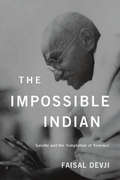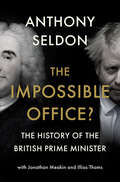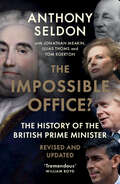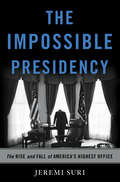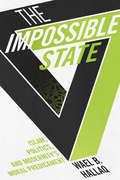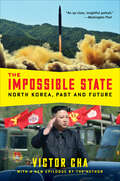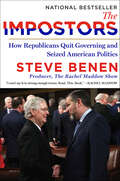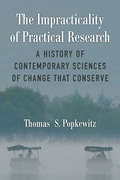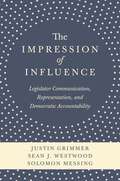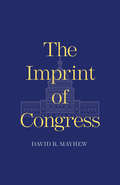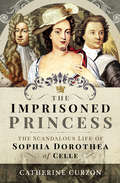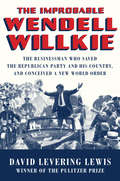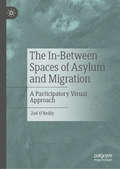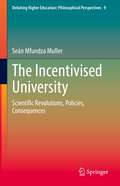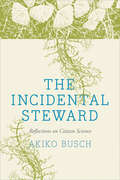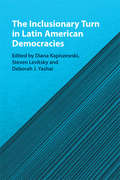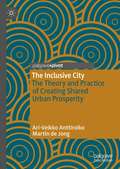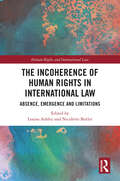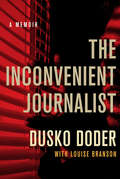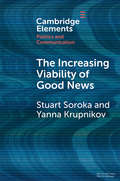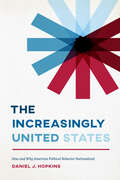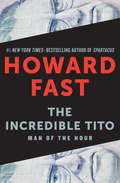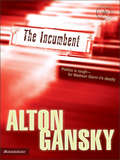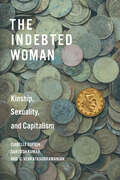- Table View
- List View
The Impossible Indian: Gandhi and the Temptation of Violence
by Faisal DevjiThe Impossible Indian offers a rare, fresh view of Gandhi as a hard-hitting political thinker willing to countenance the greatest violence in pursuit of a global vision that went far beyond a nationalist agenda. Revising the conventional view of the Mahatma as an isolated Indian moralist detached from the mainstream of twentieth-century politics, Faisal Devji offers a provocative new genealogy of Gandhian thought, one that is not rooted in a clichéd alternative history of spiritual India but arises from a tradition of conquest and violence in the battlefields of 1857. Focusing on his unsentimental engagement with the hard facts of imperial domination, Fascism, and civil war, Devji recasts Gandhi as a man at the center of modern history. Rejecting Western notions of the rights of man, rights which can only be bestowed by a state, Gandhi turned instead to the idea of dharma, or ethical duty, as the true source of the self’s sovereignty, independent of the state. Devji demonstrates that Gandhi’s dealings with violence, guided by his idea of ethical duty, were more radical than those of contemporary revolutionists. To make sense of this seemingly incongruous relationship with violence, Devji returns to Gandhi’s writings and explores his engagement with issues beyond India’s struggle for home rule. Devji reintroduces Gandhi to a global audience in search of leadership at a time of extraordinary strife as a thinker who understood how life’s quotidian reality could be revolutionized to extraordinary effect.
The Impossible Office?: The History of the British Prime Minister
by Anthony SeldonMarking the third centenary of the office of Prime Minister, this book tells its extraordinary story, explaining how and why it has endured longer than any other democratic political office in world history. Sir Anthony Seldon, historian of Number 10 Downing Street, explores the lives and careers, loves and scandals, successes and failures, of all our great Prime Ministers. From Robert Walpole and William Pitt the Younger, to Clement Attlee and Margaret Thatcher, Seldon discusses which of our Prime Ministers have been most effective and why. He reveals the changing relationship between the Monarchy and the office of the Prime Minister in intimate detail, describing how the increasing power of the Prime Minister in becoming leader of Britain coincided with the steadily falling influence of the Monarchy. This book celebrates the humanity and frailty, work and achievement, of these 55 remarkable individuals, who averted revolution and civil war, leading the country through times of peace, crisis and war.
The Impossible Office?: The History of the British Prime Minister - Revised and Updated
by Anthony SeldonA Times and Sunday Times Book of the Year. The recent political chaos enfolding Downing Street provides the framing for the extraordinary story of the office of Prime Minister, and how and why it has endured longer than any other democratic political office in world history. Sir Anthony Seldon, historian of Number 10, explores the lives and careers, crises and scandals, and successes and failures of our great Prime Ministers from Robert Walpole to Clement Attlee and Margaret Thatcher, up to the recent churn of Boris Johnson, Liz Truss and Rishi Sunak. Seldon discusses which of our PMs have been most effective and why, as well as probing the changing relationship between the Monarchy and the Prime Minister in intimate detail. A celebration of the humanity, frailty, work and achievements of 57 remarkable individuals who averted revolution and civil war, leading the country through times of peace, crisis and war.
The Impossible Presidency: The Rise and Fall of America's Highest Office
by Jeremi SuriA bold new history of the American presidency, arguing that the successful presidents of the past created unrealistic expectations for every president since JFK, with enormously problematic implications for American politicsIn The Impossible Presidency, celebrated historian Jeremi Suri charts the rise and fall of the American presidency, from the limited role envisaged by the Founding Fathers to its current status as the most powerful job in the world. He argues that the presidency is a victim of its own success-the vastness of the job makes it almost impossible to fulfill the expectations placed upon it. As managers of the world's largest economy and military, contemporary presidents must react to a truly globalized world in a twenty-four-hour news cycle. There is little room left for bold vision.Suri traces America's disenchantment with our recent presidents to the inevitable mismatch between presidential promises and the structural limitations of the office. A masterful reassessment of presidential history, this book is essential reading for anyone trying to understand America's fraught political climate.
The Impossible State
by Wael B. HallaqWael B. Hallaq boldly argues that the "Islamic state," judged by any standard definition of what the modern state represents, is both an impossible and inherently self-contradictory concept. Comparing the legal, political, moral, and constitutional histories of pre-modern Islam and Euro-America, he finds the adoption and practice of the modern state to be highly problematic for modern Muslims. He then conducts a more expansive critique of modernity's moral predicament, which renders impossible any project resting solely on ethical foundations.The modern state not only suffers from serious legal, political, and constitutional issues, Hallaq argues, but it also, by its very nature, fashions a subject inconsistent with what it means to be, or to live as, a Muslim. By Islamic standards, the state's technologies of the self are severely lacking in moral substance, and the Muslim state, as Hallaq shows, has done little to advance an acceptable form of genuine Shari'a governance. The Islamists' constitutional battles in Egypt and Pakistan, the Islamic legal and political failures of the Iranian Revolution, and similar disappointments underscore this fact. Nevertheless, the state remains the favored template of the Islamists and the ulama (Muslim clergymen). Providing Muslims with a path toward realizing the good life, Hallaq turns to the rich moral resources of Islamic history. Along the way, he proves political and other "crises of Islam" are not unique to the Islamic world nor to the Muslim religion. These crises are integral to the modern condition of both East and West, and recognizing such parallels enables Muslims to engage more productively with their Western counterparts.
The Impossible State: Islam, Politics, and Modernity's Moral Predicament
by Wael HallaqWael B. Hallaq boldly argues that the "Islamic state," judged by any standard definition of what the modern state represents, is both impossible and inherently self-contradictory. Comparing the legal, political, moral, and constitutional histories of premodern Islam and Euro-America, he finds the adoption and practice of the modern state to be highly problematic for modern Muslims. He also critiques more expansively modernity's moral predicament, which renders impossible any project resting solely on ethical foundations. The modern state not only suffers from serious legal, political, and constitutional issues, Hallaq argues, but also, by its very nature, fashions a subject inconsistent with what it means to be, or to live as, a Muslim. By Islamic standards, the state's technologies of the self are severely lacking in moral substance, and today's Islamic state, as Hallaq shows, has done little to advance an acceptable form of genuine Shari'a governance. The Islamists' constitutional battles in Egypt and Pakistan, the Islamic legal and political failures of the Iranian Revolution, and similar disappointments underscore this fact. Nevertheless, the state remains the favored template of the Islamists and the ulama (Muslim clergymen). Providing Muslims with a path toward realizing the good life, Hallaq turns to the rich moral resources of Islamic history. Along the way, he proves political and other "crises of Islam" are not unique to the Islamic world nor to the Muslim religion. These crises are integral to the modern condition of both East and West, and by acknowledging these parallels, Muslims can engage more productively with their Western counterparts.
The Impossible State: North Korea, Past and Future
by Victor ChaFrom a seasoned advisor, &“a meaty, fast-paced portrait of North Korean society, economy, politics and foreign policy&” (Foreign Affairs). In The Impossible State, international-policy expert and former Director for Asian Affairs at the National Security Council Victor Cha pulls back the curtain on this controversial and isolated country, providing the best look yet at North Korea&’s history, the rise of the Kim family dynasty, and the obsessive personality cult that empowers them. He illuminates the repressive regime's complex economy and culture, its appalling record of human-rights abuses, and its belligerent relationship with the United States, and analyzes the regime&’s major security issues—from the seemingly endless war with its southern neighbor to its frightening nuclear ambitions—all in light of the destabilizing effects of Kim Jong-il's death and the pivotal and disquieting transition of power from tyrannical father to inexperienced son. How this enigmatic nation-state—one that regularly violates its own citizens&’ inalienable rights and has suffered famine, global economic sanctions, a collapsed economy, and near total isolation from the rest of the world—has continued to survive has long been a question that preoccupies the West. Cha reveals a land of contradictions, and delves into the ideology that leads an oppressed, starving populace to cling so fiercely to its failed leadership. With rare personal anecdotes from the author&’s time in Pyongyang and his tenure as an adviser in the White House, this authoritative, accessible, &“engrossing&” history (The Economist) offers much-needed understanding of the country&’s veiled past and uncertain future. &“An up-close, insightful portrait.&” —The Washington Post &“An eye-opening view of the closed, repressive dictatorship of North Korea. . . . A useful, pertinent work for understanding the human story behind the headlines.&” —Kirkus Reviews
The Impostors: How Republicans Quit Governing and Seized American Politics
by Steve BenenNATIONAL BESTSELLER, updated with a new afterword“This is the definitive account of what has gone wrong in our two-party system, and how our democracy has to adapt to survive it. I can't say it in strong enough terms: Read. This. Book.” —RACHEL MADDOWThe award-winning producer of The Rachel Maddow Show exposes the Republican Party as a gang of impostors, meticulously documenting how they have abandoned their duty to govern and are gravely endangering AmericaFor decades, American voters innocently assumed the two major political parties were equally mature and responsible governing entities, ideological differences aside. That belief is due for an overhaul: in recent years, the Republican Party has undergone an astonishing metamorphosis, one so baffling and complete that few have fully reckoned with the reality and its consequences.Republicans, simply put, have quit governing. As MSNBC's Steve Benen charts in his groundbreaking new book, the contemporary GOP has become a "post-policy party." Republicans are effectively impostors, presenting themselves as officials who are ready to take seriously the substance of problem solving, but whose sole focus is the pursuit and maintenance of power. Astonishingly, they are winning–at the cost of pushing the political system to the breaking point.Despite having billed itself as the "party of ideas," the Republican Party has walked away from the hard but necessary work of policymaking. It is disdainful of expertise and hostile toward evidence and arithmetic. It is tethered to few, if any, meaningful policy preferences. It does not know, and does not care, about how competing proposals should be crafted, scrutinized, or implemented. This policy nihilism dominated the party's posture throughout Barack Obama's presidency, which in turn opened the door to Donald Trump -- who would cement the GOP's post-policy status in ways that were difficult to even imagine a few years earlier.The implications of this approach to governance are all-encompassing. Voters routinely elect Republicans such as Mitch McConnell and Ted Cruz to powerful offices, expecting GOP policymakers to have the technocratic wherewithal to identify problems, weigh alternative solutions, forge coalitions, accept compromises, and apply some level of governmental competence, if not expertise. The party has consistently proven those hopes misguided.The result is an untenable political model that's undermining the American policymaking process and failing to serve the public's interests. The vital challenge facing the civil polity is coming to terms with the party's collapse as a governing entity and considering what the party can do to find its policymaking footing anew.The Impostors serves as a devastating indictment of the GOP's breakdown, identifying the culprits, the crisis, and its effects, while challenging Republicans with an imperative question: Are they ready to change direction? As Benen writes, "A great deal is riding on their answer."
The Impracticality of Practical Research: A History of Contemporary Sciences of Change That Conserve
by Thomas S. PopkewitzThere is an alluring desire that research should lead us to find the practical knowledge that enables people to live a good life in a just and equitable society. This desire haunted the 19th century emergence of the social sciences as a discipline, then became more pronounced in the postwar mobilizations of research. Today that desire lives on in the international assessments of national schools and in the structure of professional education, both of which influence government modernization of schools and also provide for people’s well-being. American policy thus reflects research in which reforms are verified by “scientific, empirical evidences” about “what works” in experiments, and “will work” therefore in society. The book explores the idea that practical and useful knowledge changes over time, and shows how this knowledge has been (re)visioned in contemporary research on educational reform, instructional improvement, and professionalization. The study of science draws on a range of social and cultural theories and historical studies to understand the politics of science, as well as scientific knowledge that is concerned with social and educational change. Research hopes to change social conditions to create a better life, and to shape people whose conduct embodies these valued characteristics—the good citizen, parent, or worker. Yet this hope continually articulates the dangers that threaten this future. Thomas Popkewitz explores how the research to correct social wrongs is paradoxically entangled with the inscription of differences that ultimately hamper the efforts to include.
The Impression of Influence: Legislator Communication, Representation, and Democratic Accountability
by Justin Grimmer Sean J. Westwood Solomon MessingConstituents often fail to hold their representatives accountable for federal spending decisions—even though those very choices have a pervasive influence on American life. Why does this happen? Breaking new ground in the study of representation, The Impression of Influence demonstrates how legislators skillfully inform constituents with strategic communication and how this facilitates or undermines accountability. Using a massive collection of Congressional texts and innovative experiments and methods, the book shows how legislators create an impression of influence through credit claiming messages.Anticipating constituents' reactions, legislators claim credit for programs that elicit a positive response, making constituents believe their legislator is effectively representing their district. This spurs legislators to create and defend projects popular with their constituents. Yet legislators claim credit for much more—they announce projects long before they begin, deceptively imply they deserve credit for expenditures they had little role in securing, and boast about minuscule projects. Unfortunately, legislators get away with seeking credit broadly because constituents evaluate the actions that are reported, rather than the size of the expenditures.The Impression of Influence raises critical questions about how citizens hold their political representatives accountable and when deception is allowable in a democracy.
The Imprint of Congress
by David R. MayhewWhat kind of job has America's routinely disparaged legislative body actually done? In The Imprint of Congress, the distinguished congressional scholar David R. Mayhew gives us an insightful historical analysis of the U.S. Congress’s performance from the late eighteenth century to today, exploring what its lasting imprint has been on American politics and society. Mayhew suggests that Congress has balanced the presidency in a surprising variety of ways, and in doing so, it has contributed to the legitimacy of a governing system faced by an often fractious public.
The Imprisoned Princess: The Scandalous Life of Sophia Dorothea of Celle
by Catherine CurzonThis royal biography of the 17th century princess and mother of King George II recounts an epic tale of privilege, passion, scandal, and disgrace.When Sophia Dorothea of Celle married her first cousin, the future King George I, she was an unhappy bride. Filled with dreams of romance and privilege, she hated the groom she called “pig snout” and wept at news of her engagement. When she arrived in the austere court of Hanover, the vibrant young princess found herself ignored and unwanted—while her husband openly gallivanted with his mistress.Then Sophia Dorothea plunged into a dangerous affair with the dashing soldier Count Phillip Christoph von Königsmarck, a man as celebrated for his looks as his bravery. When he and Sophia Dorothea fell in love, they were dicing with death. Watched by a scheming countess who had ambitions of her own, it was only a matter of time before scandal gripped the House of Hanover. In the end, Sophia Dorothea was divorced, disgraced, and locked away in a gilded cage for 30 years—whilst her lover faced an even darker fate.
The Improbable Wendell Willkie: The Businessman Who Saved The Republican Party And His Country, And Conceived A New World Order
by David Levering LewisFrom the two-time Pulitzer Prize winner comes this surprising portrait of Wendell Willkie, the businessman–turned–presidential candidate who (almost) saved America’s dysfunctional political system. In the wake of one of the most tumultuous Republican conventions ever, the party of Lincoln nominated in 1940 a prominent businessman and former Democrat who could have saved America’s sclerotic political system. Although Wendell Lewis Willkie would lose to FDR, acclaimed biographer David Levering Lewis demonstrates that the corporate chairman–turned–presidential candidate must be regarded as one of the most exciting, intellectually able, and authentically transformational figures to stride the twentieth-century American political landscape. Born in Elwood, Indiana, in 1892, Willkie was certainly one of the most unexpected, if not unlikely, candidates for the presidency, only somewhat less unlikely than Barack Hussein Obama. Although previously marginalized by journalists like Theodore H. White and David Halberstam as a political invention of rich newspaper publishers, the Willkie who emerges here is a man governed by principles who seldom allowed rigid categories to stand in his way. Even as a young man, he quickly distinguished himself as a reform-minded lawyer, whose farm-boy haircut, hayseed manners, and sartorial indifference bespoke common-man straightforwardness but concealed an ambition that propelled him at forty to chairman of Commonwealth and Southern, the country’s third-largest private utility holding company. It was Willkie’s vehement opposition to government regulation of the free-market economy and his success in wrenching a fabulous monetary settlement from the Tennessee Valley Authority that attracted the attention of Republican leaders, who, like Willkie, felt that FDR was turning the office into an imperial presidency. Successful at outwitting the isolationist wing of his own party, Willkie took on Roosevelt during one of the nation’s darkest periods, creating an unlikely alliance of supporters, including anti-big-government business leaders and black voters, who rightly felt excluded from New Deal benefits. Despite receiving the largest percentage of Republican votes in a generation, Willkie lost but, in the process, proposed sweeping civil rights reform a full generation before the civil rights era and a progressive “new conception of the world” that remains inspirational at a time when our own national belief system has become alarmingly immoral and rudderless. Rather than continue a political battle that could have weakened the nation during its darkest hour, a defeated Willkie reconciled with the president and embraced the war effort, while writing One World, a visionary credo that hoped to instigate an international movement for the betterment of the world’s people. In rejecting America’s penchant for exceptionalism, Willkie championed this internationalism more passionately than any American politician before him, creating a sovereign philosophy of liberalism that balanced free enterprise with social responsibility. His untimely death at fifty-two in 1944 left this prophetic vision tragically stillborn.
The In-Between Spaces of Asylum and Migration: A Participatory Visual Approach
by Zoë O’ReillyBased on ethnographic research with asylum seekers living in a ‘direct provision’ centre in Ireland, and comprising participatory visual methods, this work offers a unique examination of the ‘direct provision’ system that analyses the tensions between exclusion and marginalization, and involvement and engagement with local communities. It gives voice to the perspectives of residents themselves through an analysis of photographic images and texts created by the participants of the project, providing fresh insight into the everyday experiences of living in these liminal zones between borders, and the various forms of attachment, engagement and belonging that they create. While the book’s empirical focus is on the Irish context, the analysis sheds light on broader policies and experiences of exclusion and the increasing number of liminal spaces between and within borders in which people seeking protection wait. Situated at the intersection of social anthropology, human geography and participatory arts and visual culture, it will appeal to scholars and students focusing on migration and asylum, ethnicity and integration, as well as those with an interest in participatory and visual research methods.
The Incentivised University: Scientific Revolutions, Policies, Consequences (Debating Higher Education: Philosophical Perspectives #9)
by Seán Mfundza MullerThe core thesis of this book is that to understand the implications of incentive structures in modern higher education, we require a deeper understanding of associated issues in the philosophy of science. Significant public and philanthropic resources are directed towards various forms of research in the hope of addressing key societal problems. That view, and the associated allocation of resources, relies on the assumption that academic research will tend towards finding truth – or at least selecting the best approximations of it. The present book builds on, and extends, contributions in philosophy and higher education to argue that this assumption is misplaced: with serious implications for modern higher education and its role in informing societal decisions and government policy. The book develops a philosophical foundation for the analysis of the connection between higher education incentives, scientific progress and societal outcomes. That in turn is used to demonstrate how the current approach to incentivising intellectual and scientific progress is likely not only to fail, but in fact to cause harm on the very dimensions it purports to improve. The arguments presented are illustrated with examples from medicine and academic economics, making the book one of the first to examine issues of scientific progress and social consequences across the human and social sciences. In doing so, it develops a novel critique of modern economics that in turn provides a more philosophically substantive foundation for popular critiques of economics than has existed to date.
The Incidental Steward: Reflections on Citizen Science
by Akiko BuschA search for a radio-tagged Indiana bat roosting in the woods behind her house in New York's Hudson Valley led Akiko Busch to assorted other encounters with the natural world--local ecological monitoring projects, community-organized cleanup efforts, and data-driven citizen science research. Whether it is pulling up water chestnuts in the Hudson River, measuring beds of submerged aquatic vegetation, or searching out vernal pools, all are efforts that illuminate the role of ordinary citizens as stewards of place. In this elegantly written book, Busch highlights factors that distinguish twenty-first-century citizen scientists from traditional amateur naturalists: a greater sense of urgency, helpful new technologies, and the expanded possibilities of crowdsourcing. The observations here look both to precisely recorded data sheets and to the impressionistic marginalia, scribbled asides, and side roads that often attend such unpredictable outings. While not a primer on the prescribed protocols of citizen science, the book combines vivid natural history, a deep sense of place, and reflection about our changing world. Musing on the expanding potential of citizen science, the author celebrates today's renewed volunteerism and the opportunities it offers for regaining a deep sense of connection to place.
The Inclusionary Turn in Latin American Democracies
by Steven Levitsky Diana Kapiszewski Deborah J. YasharLatin American states took dramatic steps toward greater inclusion during the late twentieth and early twenty-first Centuries. Bringing together an accomplished group of scholars, this volume examines this shift by introducing three dimensions of inclusion: official recognition of historically excluded groups, access to policymaking, and resource redistribution. Tracing the movement along these dimensions since the 1990s, the editors argue that the endurance of democratic politics, combined with longstanding social inequalities, create the impetus for inclusionary reforms. Diverse chapters explore how factors such as the role of partisanship and electoral clientelism, constitutional design, state capacity, social protest, populism, commodity rents, international diffusion, and historical legacies encouraged or inhibited inclusionary reform during the late 1990s and early 2000s. Featuring original empirical evidence and a strong theoretical framework, the book considers cross-national variation, delves into the surprising paradoxes of inclusion, and identifies the obstacles hindering further fundamental change.
The Inclusive City: The Theory and Practice of Creating Shared Urban Prosperity
by Ari-Veikko Anttiroiko Martin de JongThis book provides a conceptual framework for understanding the inclusive city. It clarifies the concept, dimensions and tensions of social and economic inclusion and outlines different forms of exclusion to which inclusion may be an antidote. The authors argue that as inclusion involves a range of inter-group and intragroup tensions, the unifying role of local government is crucial in making inclusion a reality for all, as is also the adoption of an inclusive and collaborative governance style. The book emphasizes the need to shift from citizens’ rights to value creation, thus building a connection with urban economic development. It demonstrates that inclusion is an opportunity to widen the local resource base, create collaborative synergies, and improve conditions for entrepreneurship, which are conducive to the creation of shared urban prosperity.
The Incoherence of Human Rights in International Law: Absence, Emergence and Limitations (ISSN)
by Louisa Ashley and Nicolette ButlerIncoherence is a term that is all too often associated with the public international law regime. To a great extent, its incoherence is arguably a natural consequence of the fragmented nature of both the development and overall scope of the discipline. Despite significant achievements since the Universal Declaration of Human Rights (1948), a coherent human rights regime that is properly integrated with other branches of public international law is still lacking. This book explores this incoherent approach to human rights, including specific challenges that arise as a result of the creation and regulation of legal relationships between parties (state and non-state) that sit outside of the human rights framework, with a view to considering how it may be remedied. Divided into three parts, the collection provides a critical exploration of various challenges and barriers related to the absence of human rights in some instances, contemporary emergence of rights, and a lack of rights fulfilment in others. These three situations are considered within the wider context of, and difficulties facing, a human rights-based approach to international law. Each of the three parts aligns with one of the three prime responsibilities and duties of states in respect of international human rights: to promote, to protect and to fulfil. The contributions represent different perspectives in international law and human rights and how the global agenda of promoting human rights, the rules-based international order and multilateralism requires further strengthening – the lens of incoherence providing a means to understand particular inconsistencies. Chapters focus upon subjects including international investment law, international financial contracts, the arms trade, indigenous peoples’ rights, rights of peasants, the right to a clean, healthy and sustainable environment, the right to food and transitional justice. Presenting a critical exploration of key contemporary challenges and the implementation of human rights law in different contexts, the collection will be of interest to a wide-ranging audience of international law and international relations scholars and practitioners, and students of law, politics and globalisation across the world.
The Inconvenient Journalist: A Memoir
by Dusko DoderIn The Inconvenient Journalist, Dusko Doder, writing with his spouse and journalistic partner Louise Branson, describes how one February night crystalized the values and personal risks that shaped his life. The frigid Moscow night in question was in 1984, and Washington Post correspondent Doder reported signs that Soviet leader Yuri Andropov had died. The CIA at first dismissed the reporting, saying that "Doder must be smoking pot." When Soviet authorities confirmed Andropov's death, journalists and intelligence officials questioned how a lone reporter could scoop the multibillion-dollar US spy agency. The stage was set for Cold War-style revenge against the star journalist, and that long night at the teletype machine in Moscow became a pivotal moment in Doder's life. After emigrating to the United States from Yugoslavia in 1956, Doder committed himself to the journalist's mission. He knew that reporting the truth could come at a price, something driven home by his years of covering Soviet dissidents and watching his Washington Post colleagues break the Watergate story. Still, he was not prepared for a cloaked act of reprisal from the CIA. Taking aim at Doder, the CIA insinuated a story into Time magazine suggesting that he had been coopted by the KGB. Doder's professional world collapsed and his personal life was shaken as he fought Time in court. In The Inconvenient Journalist, Doder reflects on this attempt to destroy his reputation, his dedication to reporting the truth, and the vital but precarious role of the free press today. The Inconvenient Journalist is a powerful human story and a must-read for all concerned about freedom of the press and truthful reporting.
The Increasing Viability of Good News (Elements in Politics and Communication)
by Yanna Krupnikov Stuart SorokaIn spite of what appears to be the increasingly negative tone of media coverage, this Element suggests that the prevalence of positive news is likely to increase, for three reasons: (1) valence-based asymmetries vary over time, (2) valence-based asymmetries vary across individuals, and (3) technology facilitates diverse news platforms catering to diverse preferences. Each of these claims is examined in detail here, based on analyses of prior and/or novel data on media content, psychophysiological responses, and survey-based experiments. Results are considered as they relate to our understanding of media gatekeeping, political communication, and political psychology, and also as actionable findings for producers of media content, communications platforms, and media consumers.
The Increasingly United States: How and Why American Political Behavior Nationalized (Chicago Studies in American Politics)
by Daniel J. HopkinsIn a campaign for state or local office these days, you’re as likely today to hear accusations that an opponent advanced Obamacare or supported Donald Trump as you are to hear about issues affecting the state or local community. This is because American political behavior has become substantially more nationalized. American voters are far more engaged with and knowledgeable about what’s happening in Washington, DC, than in similar messages whether they are in the South, the Northeast, or the Midwest. Gone are the days when all politics was local. With The Increasingly United States, Daniel J. Hopkins explores this trend and its implications for the American political system. The change is significant in part because it works against a key rationale of America’s federalist system, which was built on the assumption that citizens would be more strongly attached to their states and localities. It also has profound implications for how voters are represented. If voters are well informed about state politics, for example, the governor has an incentive to deliver what voters—or at least a pivotal segment of them—want. But if voters are likely to back the same party in gubernatorial as in presidential elections irrespective of the governor’s actions in office, governors may instead come to see their ambitions as tethered more closely to their status in the national party.
The Incredible Tito: Man of the Hour
by Howard FastFast&’s fascinating biography of Joseph Broz, known to the world as Tito, including his rise to power and his remarkable stand against fascismThe world was mired in the Second World War when Howard Fast wrote The Incredible Tito. Upon the book&’s publication in 1944, there was still no united Yugoslavia, the Axis controlled most of Europe, and D-Day was only in the planning stages. In the Balkans, Tito was a beacon of hope against the advancing Nazis. He led a force of resistance fighters that bedeviled the occupying German army throughout Slavic regions and empowered people&’s committees to act as local government in all liberated areas. For observers on the political left, Tito seemed uniquely poised to unite the East and West against fascism—once and for all. This ebook features an illustrated biography of Howard Fast including rare photos from the author&’s estate.
The Incumbent
by Alton L. GanskyAn abduction. . . a trail of disturbing clues. . . Politics are about to become deadly. As the controversial mayor of the beautiful coastal community of Santa Rita, Madison 'Maddy' Glenn likes to face things head-on. But nothing can prepare her for a hostile visit from the chief of police---or his terrible news. Lisa Truccoli, Maddy's friend and the treasurer of her last campaign, has been kidnapped. All that remains at the crime scene is a shocking clue. . . with Maddy's name on it. The ensuing hunt for answers only turns up more sinister clues in a terrifying game the abductor wants to play. . . with Maddy. Caught between a haunting past and a dangerous present, Maddy finds the walls that keep her from faith beginning to crumble. The stakes turn lethal with a second abduction and a clue that reveals inside information about Maddy's run for Congress---a decision she has not made yet. Someone is going to dangerous lengths to make the choice for her. . . but it is a choice she'll survive?
The Indebted Woman: Kinship, Sexuality, and Capitalism (Culture and Economic Life)
by Santosh Kumar Isabelle Guérin G. VenkatasubramanianWomen, and particularly poor women, have become essential cogs in the wheel of financialized capitalism. Globally, women are responsible for managing household debt, and that debt has exploded over the last decade, reaching an all-time high after the COVID-19 pandemic. Across various categories of loans, including subprime lending, microcredit policies, and consumer loans, as well as rent and utilities, women are overrepresented as clients and managers, and are being enfolded into the system. The Indebted Woman discusses the crucial yet invisible roles poor women play in making and consolidating debt and credit markets. Isabelle Guérin, Santosh Kumar, and G. Venkatasubramanian spent over two decades observing a credit market that specifically targets women in the Indian countryside of east-central Tamil Nadu. They found that paying off debts required labor, frequently involved sexual transactions, and shaped women's bodies and subjectivities. Bringing together ethnography, statistical surveys, and financial diaries, they offer for the first time a comprehensive theory for this sexual division of debt that goes far beyond the Indian case, exposing the ways capitalism transforms womanhood and how this transformation in turn fuels capitalism.
